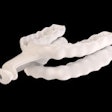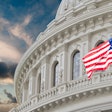
Citing precedents in Florida and California, the American Academy of Implant Dentistry (AAID) has filed a lawsuit against the Texas State Board of Dental Examiners aimed at overturning a stated regulation that restricts dentists from advertising AAID credentials in implant dentistry.
The AAID is seeking a permanent injunction and declaratory judgment to strike down rule 1855, which allows unrestricted advertising only for dental credentials and accreditations issued by organizations recognized as dental specialties by the ADA, according to the AAID.
Dentists with credentials not issued by ADA-recognized specialty organizations are required to include lengthy disclaimers in their advertising in Texas, the AAID said.
This limitation, contends the AAID, prohibits dentists from advertising true statements about credentials in implant dentistry earned from the AAID and the American Board of Oral Implantology.
But Joy Sparks, attorney for the Texas State Board of Dental Examiners, disputed that characterization in an interview with DrBicuspid.com.
"If they don't have one of those recognized specialties, they don't have to include a disclaimer," Sparks said. "They have to tell the public the extent of education they've had because none of these things are weekend courses. The AAID has numerous requirements to be a member. [The rule] just requires the public to be informed of the extent of those credentials."
But the AAID claims the rule is "unconstitutional," according to the academy's chief legal counsel, Frank Recker, JD, DDS.
"Consumers in Texas have no ready means of learning which dentists practicing in their state have significant substantive training in implant dentistry," Dr. Recker told DrBicuspid.com. "Awareness of AAID's dental implant credential provides consumers with objectively verifiable information regarding a dentist's knowledge, proficiency, and experience."
“We're looked at as a perceived enemy, but we're trying to help.”
— Frank Recker, JD, DDS, AAID's chief
legal counsel
Dr. Recker had previously informed the Texas Board of Dental Examiners in writing about the Florida and California precedents and hoped to convince the Board to rescind its restrictions and avoid litigation.
"We kept Texas informed as those cases unfolded because they had a similar rule, but they did not respond," Dr. Recker said. "Their nonresponse left us no choice but to act."
Already taking action
The board has already taken action to change the law, according to Sparks.
"We've had an advertising committee formed for several months," she said. "They proposed a repeal of the current advertising rules at the last board meeting so they can propose new rules."
The new rule, which is awaiting the completion of a required 30-day public comment period, will not require lengthy disclaimers, Sparks noted.
"I don't anticipate anything that would keep it from being passed," she added. "Whether it makes the lawsuit moot or not, that will have to be the determination of the attorneys for the AAID."
The AAID has made attempts to work with the board's advertising committee, according Dr. Recker.
"I found out that they had a rules committee set up last summer, which they didn't communicate with us," Dr. Recker explained. "I also planned on attending a meeting they were holding last Thursday (April 26) because we wanted to give input, but it was canceled the day before it happened."
The new rule is unlikely to satisfy the AAID, he added.
"They're repealing it, but the replacement will be just as objectionable," he said. "We're trying to give the public more information, not dissuade them from reading. A full-page ad here can say 'implant dentist,' but you don't know if he's taken one course in it. AAID credentials have vigorous standards -- a benchmark for the consumer."
Texas attorney general Erika Kane will represent the board if the lawsuit moves forward -- a likely event, unless the language of the new rule is changed considerably, according to Dr. Recker.
"I'm hoping they're receptive, but cancelling the rules committee meeting the day before doesn't sound like wanting to reach out," he said. "This is silly in my opinion."
Texas and California spent more than $1 million defending their rules, which the AAID challenged under federal civil rights statutes, Dr. Recker added.
"We're looked at as a perceived enemy, but we're trying to help," he said. "This is not rocket science; it's First Amendment law as it applies to free speech."



















